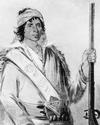- creek
-
/kreek, krik/, n.1. U.S., Canada, and Australia. a stream smaller than a river.2. a stream or channel in a coastal marsh.3. Chiefly Atlantic States and Brit. a recess or inlet in the shore of the sea.4. an estuary.5. Brit. Dial. a narrow, winding passage or hidden recess.6. up the creek, Slang. in a predicament; in a difficult or seemingly hopeless situation.[1200-50; ME creke, var. of crike < ON kriki bend, crook]
* * *
or MuscogeeMuskogean-speaking North American Indian people living mainly in Oklahoma, U.S., but also in Georgia and Alabama.A loose and shifting confederation of groups that once occupied much of the Georgia and Alabama flatlands, the Creek comprised two major divisions: the Upper Creeks (living on the Coosa and Tallapoosa rivers) and the Lower Creeks (living on the Chatahootchee and Flint rivers). They cultivated corn, beans, and squash. Each Creek town had a plaza or community square, often with a temple, around which were built the rectangular houses. Religious observances included the Busk (Green Corn) ceremony, an annual first-fruits and new-fire rite. In the 18th century a Creek Confederacyincluding the Natchez, Yuchi, Shawnee, and otherswas organized to present a united front against both European and Indian enemies. It proved a failure, however, since at no time did all groups contribute warriors to a common battle. The Creek War against the U.S. (1813–14) ended with the defeated Creeks ceding 23 million acres. Most were forcibly removed to Indian Territory (Oklahoma). Some 40,200 individuals claimed sole Creek ancestry in the 2000 U.S. census. Ben Perryman, a Creek Indian, painting by George Catlin, 1836; in the National Museum of American ...National Museum of American Art (formerly National Collection of Fine Arts), Smithsonian Institution, Washington, D.C., gift of Mrs. Sarah Harrison
Ben Perryman, a Creek Indian, painting by George Catlin, 1836; in the National Museum of American ...National Museum of American Art (formerly National Collection of Fine Arts), Smithsonian Institution, Washington, D.C., gift of Mrs. Sarah Harrison* * *
▪ peopleMuskogean-speaking North American Indian tribe that originally occupied a huge expanse of the flatlands of what are now Georgia and Alabama. There were two divisions of Creeks: the Muskogee (or Upper Creeks), settlers of the northern Creek territory; and the Hitchiti and Alabama, who had the same general traditions as the Upper Creeks but spoke a slightly different dialect and were known as the Lower Creeks.Traditional Creek economy was based largely on the cultivation of corn (maize), beans, and squash. Most of the farming was done by women, while the men of the tribe were responsible for hunting and defense. The Creek achieved status based on individual merit rather than by inheriting it. Like most Indians of the Southeast, they commonly tattooed their entire bodies.Before colonization, Creek towns were symbolically grouped into white and red categories, set apart for peace ceremonials and war ceremonials, respectively. Each town had a plaza or community square, around which were grouped the houses—rectangular structures with four vertical walls of poles plastered over with mud to form wattle. The roofs were pitched and covered with either bark or thatch, with smoke holes left open at the gables. If the town had a temple, it was a thatched dome-shaped edifice set upon an eight-foot mound into which stairs were cut to the temple door. The plaza was the gathering point for such important religious observances as the Busk, or Green Corn, ceremony, an annual first-fruits and new-fire rite. A distinctive feature of this midsummer festival was that every wrongdoing, grievance, or crime—short of murder—was forgiven.The Creeks' first contact with Europeans occurred in 1538 when Hernando de Soto invaded their territory. Subsequently, the Creeks allied themselves with the English colonists in a succession of wars (beginning about 1703) against the Apalachee (q.v.) and the Spanish. During the 18th century, a Creek Confederacy was organized in an attempt to present a united front against both Native and white enemies. It comprised not only the dominant Creeks but also speakers of other Muskogean languages (Hitchiti, Alabama-Koasati) and of non-Muskogean languages (Yuchi, some Natchez and Shawnee). The Seminole (q.v.) of Florida and Oklahoma are a branch of the Creek Confederacy of the 18th and early 19th centuries.Ultimately, the confederacy did not succeed, in part because the Creek towns (about 50 with a total population of perhaps 20,000) were not able to coordinate the contribution of warriors to a common battle. In 1813–14, when the Creek War (q.v.) with the United States took place, some towns fought with the white colonizers and some (the Red Sticks) against them. Upon defeat, the Creeks ceded 23,000,000 acres of land (half of Alabama and part of southern Georgia); they were forcibly removed to Indian Territory (now Oklahoma) in the 1830s. There with the Cherokee, Chickasaw, Choctaw, and Seminole, they constituted one of the Five Civilized Tribes. For three-quarters of a century each tribe had a land allotment and a quasi-autonomous government modelled on that of the United States. In preparation for Oklahoma statehood (1907), some of this land was allotted to individual Indians; the rest was made available to white homesteaders, held in trust by the federal government, or allotted to freed slaves. Tribal governments were effectively dissolved in 1906 but have continued to exist on a limited basis. Creek descendants numbered more than 71,000 in the early 21st century.* * *
Universalium. 2010.
